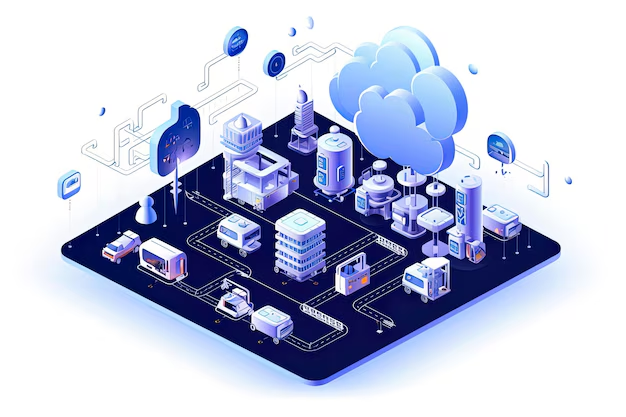Working Hours: Monday - Saturday, 10 AM - 7 PM
Blog Posted on 22 September, 2024 - 00:49 AM

Cloud Computing: A Game-Changer in Modern Business - Case Study Insights
Cloud computing has transformed the way businesses operate, offering scalable, flexible, and cost-efficient solutions. This blog explores how cloud computing has impacted different industries, providing insights into its application through case studies and real-world examples. Whether you're a small business or a multinational enterprise, cloud computing's benefits can drive innovation, streamline operations, and reduce costs.
What is Cloud Computing?
Cloud computing refers to the delivery of various services over the internet, including storage, processing, and networking. These services are divided into three primary categories:
- Infrastructure as a Service (IaaS): Provides virtualized computing resources over the internet.
- Platform as a Service (PaaS): Delivers hardware and software tools for application development.
- Software as a Service (SaaS): Hosts software applications and makes them available via the internet.
Companies no longer need to maintain expensive hardware or worry about software upgrades. They can rent computing power and storage on-demand from providers like Amazon Web Services (AWS), Microsoft Azure, or Google Cloud, paying only for the resources they use.
Case Study 1: Netflix – Streaming Services at Scale
- Challenge: Netflix faced the challenge of delivering high-quality streaming services to millions of users globally. As the demand for on-demand video surged, the need for a scalable, reliable, and high-performance infrastructure became critical.
- Solution: Netflix adopted AWS cloud services to run its entire infrastructure. AWS enabled Netflix to scale elastically, meaning that as user demand fluctuated, Netflix could easily adjust its computing resources.
- Elasticity: AWS allowed Netflix to handle surges in demand (e.g., when a new show or movie premiered) without infrastructure downtime or service degradation
- Global Reach: AWS provides a global network of data centers, ensuring that Netflix content is delivered swiftly to users worldwide.
- Cost Efficiency: Instead of investing in physical servers, Netflix uses cloud-based infrastructure, significantly reducing capital expenses.
- Outcome: Netflix's migration to AWS allowed it to scale its service rapidly, reduce costs, and maintain high uptime and performance, ensuring a seamless streaming experience for users.
Case Study 2: Airbnb – Innovation through Cloud Adoption
- Challenge: Airbnb needed an agile infrastructure to support its growth and manage its increasing user base. As a platform that connects millions of travelers with hosts worldwide, Airbnb required a reliable and flexible system to manage complex operations like payments, bookings, and communication.
- Solution: Airbnb leveraged the benefits of the cloud by adopting AWS. By migrating their workloads to AWS, Airbnb gained scalability and the ability to innovate quickly.
- Automation: Airbnb automated several processes like monitoring and scaling, using AWS’s suite of automation tools.
- Data Processing: AWS enabled Airbnb to analyze massive amounts of data, providing insights into user behavior, which enhanced customer experiences.
- Disaster Recovery: By utilizing multiple AWS regions, Airbnb ensured that its services remained operational, even in the event of a disaster or server failure.
- Outcome: With AWS, Airbnb successfully managed its global operations, reducing infrastructure management overhead and focusing on delivering value to its users. The company now operates with greater flexibility, reliability, and reduced costs.
Case Study 3: General Electric (GE) – Industrial Cloud Revolution
- Challenge: GE needed to modernize its IT infrastructure to manage the massive amounts of data generated by its industrial equipment. Its existing infrastructure couldn't support the rapid processing and analysis needed to optimize operations and improve efficiency.
- Solution: GE adopted Microsoft Azure to power its Predix platform, a cloud-based solution designed for industrial IoT (Internet of Things).
- IoT Integration: GE used cloud-based analytics to monitor and optimize industrial equipment in real time.
- Data Analytics: Azure’s machine learning and big data services helped GE analyze operational data and identify areas for improvement.
- Collaboration: Cloud-based collaboration tools allowed GE’s teams around the world to work on the same platform, improving efficiency and decision-making.
- Outcome: GE's move to Azure transformed its industrial operations, leading to cost savings, better equipment performance, and faster innovation cycles.
Key Benefits of Cloud Computing
These case studies demonstrate how companies of different sizes and industries benefit from cloud computing. Let's break down the main advantages:
- Scalability: Businesses can scale resources up or down according to their needs, ensuring they only pay for what they use.
- Cost Efficiency: With cloud computing, there is no need to invest in expensive physical infrastructure. Instead, businesses pay for the services they use on a subscription basis.
- Reliability and Uptime: Cloud providers like AWS, Azure, and Google Cloud offer reliable uptime and disaster recovery capabilities, ensuring that services are available 24/7.
- Global Reach: Cloud providers have data centers around the world, allowing businesses to expand globally without investing in physical infrastructure in each location.
- Security: Leading cloud providers have robust security measures in place, including data encryption, regular security updates, and compliance with industry regulations.
Cloud Computing in Healthcare: A Specific Use Case
Healthcare is a prime example of an industry that has benefited tremendously from cloud computing. Here's a look at how it’s revolutionizing healthcare:
- Data Storage and Access: Cloud-based platforms allow healthcare providers to store large volumes of patient data securely. Physicians can access patient records from anywhere, improving the speed and quality of care.
- Telemedicine: Cloud-based platforms allow healthcare providers to store large volumes of patient data securely. Physicians can access patient records from anywhere, improving the speed and quality of care.
- Reliability and Uptime: Cloud computing has made telemedicine possible, allowing doctors to provide care remotely using video calls and cloud-based patient management systems.
- AI and Data Analytics: Using cloud-based data processing, healthcare providers can leverage AI to analyze patient data and make more accurate diagnoses.
Challenges of Cloud Computing
While cloud computing offers numerous benefits, there are also challenges businesses must be aware of:
- Data Privacy and Security: Storing data on third-party servers introduces potential privacy and security concerns. Businesses must ensure compliance with industry regulations like GDPR or HIPAA.
- Downtime Risks: Although cloud providers offer high uptime guarantees, downtime can still occur due to technical issues or cyberattacks.
- Vendor Lock-in: Companies may find it challenging to switch cloud providers due to the complexities involved in migrating data and applications.
- Cost Management: While cloud computing is often more cost-effective, poorly managed usage can lead to unexpectedly high bills.
Future of Cloud Computing
Cloud computing continues to evolve, with new trends and technologies emerging to shape its future:
- Hybrid Cloud Solutions: Many businesses are adopting hybrid cloud models, which combine private and public clouds, offering greater flexibility and control over data.
- AI Integration: AI-powered cloud platforms are becoming more common, helping businesses automate processes, enhance decision-making, and personalize user experiences.
- Edge Computing: Cloud providers are exploring edge computing, which processes data closer to the source, reducing latency and improving performance for real-time applications like autonomous vehicles.
- Quantum Computing: The future of cloud computing might involve quantum computing, which promises to revolutionize complex data processing tasks.
“Cloud computing is not just a technology shift; it's a transformation that empowers businesses to scale, innovate, and adapt with unprecedented agility and efficiency.”
Conclusion
Cloud computing has become a cornerstone of modern business, enabling companies like Netflix, Airbnb, and GE to scale, innovate, and succeed in an increasingly competitive landscape. Whether it's through enhancing customer experiences, optimizing operations, or supporting global expansion, cloud computing provides the flexibility, efficiency, and reliability that businesses need to thrive.
As more industries continue to adopt cloud solutions, the potential for innovation and growth is boundless. With advances in AI, edge computing, and hybrid cloud models, the future of cloud computing holds even greater promise, and businesses that embrace these technologies will be at the forefront of this revolution.
Insightful Blogs
Discover insightful blogs that offer valuable perspectives, expert opinions, and engaging content on the latest trends and developments.
Get In Touch
With Us
We are headquartered in Kolkata, India. Send us your message and we shall get back to you soon.
Come and See the Future with Us
Let's make something great together. We are trusted by over 50+ clients. Join them by using our services and grow your business.




